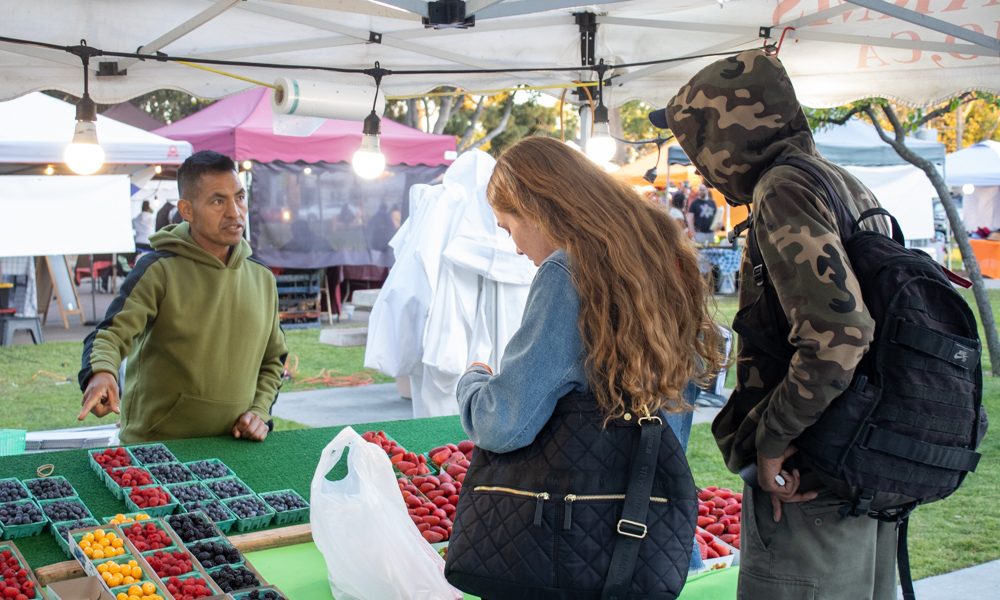On Tuesday and Wednesday evenings, farmers, street food vendors and craftspeople come together to sell their goods at farmer’s markets organized by Local Harvest.
Located at Bixby Park, 130 Cherry Ave, and Marine Stadium, 5255 E Paoli Way. Both locations are within walking distance of attractive waterfronts.
From 3 p.m. to 8 p.m. sellers and market-goers gather and as the sun sets, the market illuminates. String lights dangle over small farm produce stands while lines form at the pupusa stand and at the empanada stand. Next to that, award-winning tamales were sold at a stand and the lingering smell of rotisserie came from The Chicken Guys food truck.
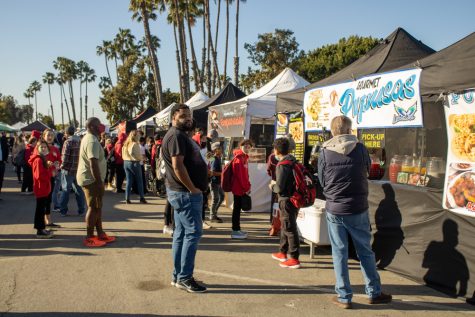
Garcia’s Roasted Peanuts sits among these stands, selling plastic bags of locally packaged nuts. Abel Garcia, who along with his brothers, helps his father run the business, explained the advantages of buying local.
“You’re getting quality here, nothing old, everything is fresh,” Garcia said.
The Garcia’s have been in business since 2004 and have been selling at Local Harvest farmer’s markets for five years. This family business is based in Orange County and they buy all their nuts and fruit wholesale from local California growers.
“We started with the roasted peanuts, and we ended up getting our packaged nuts and dry fruit,” Garcia said.
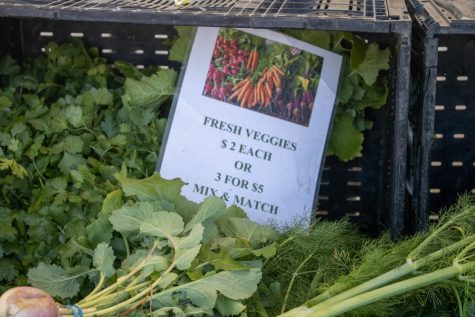
Smaller batches and a more direct farm-to-table approach have other benefits besides quality. There are several reasons why conscious consumers may opt out of the grocery store and head to their local farmer’s market.
“You get to talk to people and explain, they can sample it,” said Rose Rennie of Energy Bee Farms. “You can’t do that stuff in a grocery store.”
Rennie makes a compelling case as to why small farmers businesses such as Energy Bee Farms, which has been around for 50 years, rely on a closer connection to customers to compete against large farms. The 3,000 hives at Energy Bee Farms don’t produce enough honey to compete with corporate farms that can have upward of 200,000 hives according to Rennie.
Certified Farmer’s Markets, like the ones hosted by Local Harvest, are certified by the state of California and were established in 1977 to help small California farmers by exempting them from packing, sizing and labeling requirements.
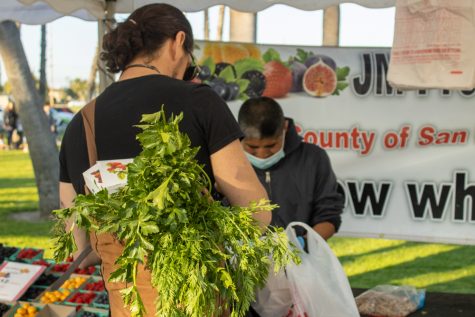
“These are tiny farms, this is not like Conagra [Farming corporation]. You have to grow here in California,” Rennie said. “These small family farms are disappearing at a rapid rate.”
Programs like Certified Farmer’s Markets have helped these small farms greatly. According to data released in 2021 by the U.S. Department of Agriculture’s National Agricultural Statistics Service, small family farms make up 79% of farms, with small being defined as having a gross income less than 350,000.
Unfortunately, the same data indicates that these small farms only make up about 5% of total agriculture revenue in the state. Meanwhile, large farms (over a million dollars in annual income) make up 7% of farms, yet account for 60% of total agriculture revenue.
Farmer Roland Tamai knows all about being one of these small farms competing against larger farms. He proudly hangs a vinyl banner at his stand with the words “We grow what we sell” scrawled beneath his family name.
The Tamai family has been farming in America since the turn of the 20th century and before that, they were farming in Japan. For Roland, farming is all he knows, and his knowledge is evident.
“I’m a farmer myself so you can ask me anything about where your food is coming from, and I think that’s real important,” Tamai said.
Tamai’s produce comes from his family’s farm located in Oxnard. According to Tamai, his customers are getting the same day’s pick while grocery stores are offering third day and beyond because produce at larger farms must be picked, packaged and shipped.
Unlike Tamai’s stand, many Local Harvest Farmer’s Markets produce stands are run by employees rather than the farmers themselves. These larger farms provide food to a larger geographical area and often require more employees, contributing to the economy.
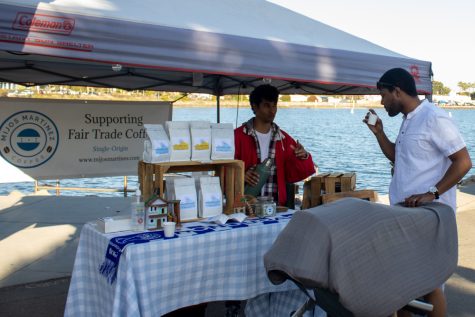
Castellanos Farms, based in Tulare County, distributes fresh produce to cities in California going as far north as Fresno and down south to San Diego.
Nora Dominguez has been working for Castellanos Farms since 2015. Twice a week on Mondays and Fridays, Dominguez’s husband drives a semi-truck to Dinuba, California to pick up fresh produce.
“It’s not like in the [super]markets where produce is often imported and stored in coolers, leading to loss in flavor and quality,” Dominguez said.
Throughout the week, she and her husband distribute the produce throughout Long Beach. Additionally, her husband occasionally works on the farm, further strengthening the farm-to-table connection.
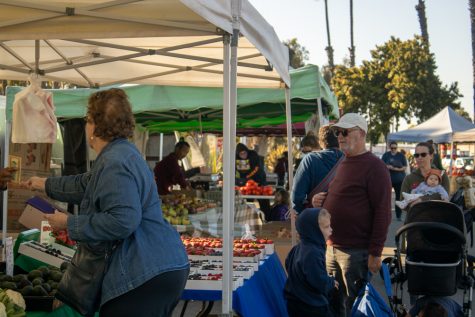
Supporting farmers at farmers markets, like the ones hosted by Local Harvest, is a great way to support small business. Not all Local Harvest vendors accept card payment. All vendors accept Farmers Market Cash which can be purchased with card payment at the information booth for zero additional fee.
For additional information about farmers’ markets in Long Beach please visit the Local Harvest website or the Long Beach Fresh website.

